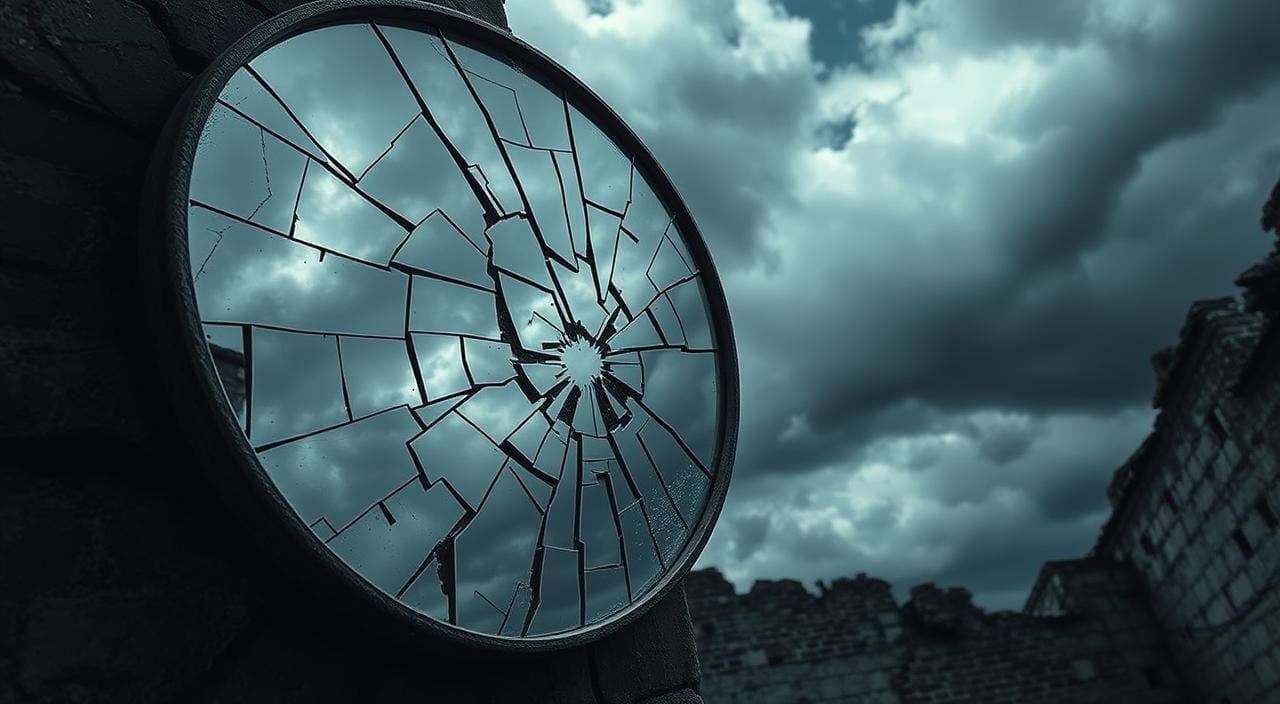Ever wondered what happens when a narcissist’s perfect image falls apart? Narcissistic collapse shows the weak side of narcissism. It happens when something threatens their big self-image, leading to a mental breakdown. This breakdown, linked to “ego death,” shows how vulnerable and emotionally unstable people with narcissistic personality disorder (NPD) can be1.
We’ll look into what causes narcissistic collapse, what triggers it, and how it affects the person and those around them. Learning about this can help us understand narcissism better and the struggles people with this disorder face2.
Key Takeaways
- Narcissistic collapse is a psychological breakdown experienced by individuals with narcissistic personality disorder when their grandiose self-image is threatened.
- The collapse can lead to intense emotions, such as anger, aggression, and feelings of rejection, often accompanied by physical symptoms like chest pain and nausea.
- Narcissistic collapse can be triggered by major life events, such as job loss or relationship breakups, that challenge the individual’s sense of superiority and control.
- Coping with narcissistic collapse requires maintaining a strong sense of self, seeking support from others, and potentially undergoing long-term therapy to address the underlying issues.
- Understanding the dynamics of narcissistic collapse is crucial for both those struggling with NPD and their loved ones, as it can lead to harmful behaviors and impact the well-being of all involved.
What is Narcissistic Personality Disorder?
Defining NPD and Its Core Symptoms
Narcissistic personality disorder (NPD) is a mental health issue. It makes people think they are more important than they really are. They also need lots of praise and have trouble feeling for others3.
At its heart, NPD is about having an overly big view of oneself. People with NPD want constant approval and act in arrogant ways. They believe they are better than everyone else and get upset easily when criticized3.
The Distinction Between Narcissism and NPD
Narcissism is a common trait, but NPD is a serious mental health issue3. Not everyone with narcissistic traits has NPD3. NPD is more severe, lasting longer, and makes it hard to care about others or understand oneself3.
People with NPD act in ways that hurt their relationships and daily life. They are more set in their ways than narcissists3.
“Narcissism later became the central feature of psychoanalytical theories of normal and abnormal personality development.”3
In 1991, Wink found two types of narcissism: ‘grandiose’ and ‘vulnerable’3. NPD was first listed in the 1987 DSM-III3.
Narcissistic Collapse: A Breakdown of the Grandiose Self
People with narcissistic personality disorder (NPD) see their worth through others’ eyes. Narcissistic collapse happens when their big self-image is threatened. This leads to a strong emotional reaction4.
When they face setbacks, their inflated self-image crumbles. This can cause them to pull back, feel sad, or even get angry and mean4.
This collapse shows a deep weakness. Their self-worth is based on what others think. So, when this support is gone, they feel empty, lost, and ashamed4.
| Narcissistic Collapse Behaviors | Potential Consequences |
|---|---|
| Withdrawal and isolation | Social isolation, loneliness, and strained relationships |
| Intense anger and vindictiveness | Damaged relationships, legal issues, and difficulties in professional settings |
| Self-destructive behaviors | Substance abuse, risk-taking, and suicidal ideation |
It’s key to understand narcissistic collapse to help those with NPD. Knowing how fragile their self-image is and how it affects them helps us support them better4.
“The narcissist’s sense of self-worth is entirely based on the interpretation of others, so when this is disrupted, it can cause a profound sense of loss and emptiness.”

Signs and Symptoms of Narcissistic Collapse
Emotional and Behavioral Manifestations
When someone with narcissistic personality disorder (NPD) feels their self-esteem is threatened, they might collapse5. This can cause them to show anger, become irritable, and act aggressively5. They might also feel like they’re being rejected more than usual5.
They might defend themselves, pull away from others, or even seek revenge5. This is all to keep up the image of being superior5.
The Role of Vulnerable and Covert Narcissism
The way someone with NPD reacts to threats can differ based on their type of narcissism5. Those with covert or vulnerable narcissism might be more likely to show anger and aggression5. This is because they tend to act out in revenge or show aggressive behavior more than those with grandiose narcissism5.
Understanding these differences is key to helping those affected6. Recognizing the signs and symptoms can help us support them better5. The Balance RehabClinic provides treatment for those dealing with narcissistic collapse7.

Triggers of Narcissistic Collapse
Narcissistic collapse is a severe and unpredictable event. It often happens when big life changes challenge the self-image of those with Narcissistic Personality Disorder (NPD). These triggers include losing a job, ending a relationship, feeling like a failure, or facing threats to their self-image8. When they can’t handle these situations, their ego breaks down. This leads to a severe emotional and psychological crisis known as narcissistic collapse.
Common Life Events That Can Precipitate a Collapse
Here are some common triggers for narcissistic collapse:
- Job loss or professional setbacks9
- Relationship breakups or the end of a significant romantic partnership9
- Perceived failures, such as the inability to achieve personal or professional goals9
- Threats to the narcissist’s self-image, such as public humiliation or criticism9
These events can break the narcissist’s illusion of being perfect and superior. They feel very vulnerable and struggle to keep up their grandiose self-image8. The collapse can be very hard, marked by emotional shutdown, ego death, and loss of control9.

Narcissistic collapse can be caused by big life events or small incidents that challenge their fragile sense of self8. Knowing what can trigger it helps those around people with NPD prepare and respond to these crises.
narcissistic collapse and ego death
Narcissistic collapse can lead to a deep ego death, where a person’s core identity is broken10. This can cause a severe existential crisis and loss of sense of self. It’s a very distressing and confusing time for those with Narcissistic Personality Disorder (NPD).
Jungian Psychology says ego death can change a person’s mind in a big way. Some find it enlightening, while others find it very hard10. Events like hitting rock bottom with alcohol or leaving an abusive relationship can trigger this experience10.
The psychological death of the ego is scary and shakes things up, especially if one holds onto old beliefs10. But, as people go through this cycle, they start to grow and connect with their true self. They learn important virtues like self-discipline and patience10.
Letting go of old beliefs is key in this journey. Qualities like grace and humility are important10. The end goal is to find and be true to oneself, feeling connected to everything10.
The ego’s dissolution can bring unconditional love and acceptance. It leads to inner peace and true freedom10. This spiritual journey often starts in the early teens, when the ego is already formed11. Ego death can also come from spiritual practices or using certain plants11.
The goal of this spiritual path is not to erase the ego completely. It’s about making the ego thinner through self-inquiry and meditation11. The ego is slowly stripped away, freeing people to see their true divine nature11.
“The ego’s dissolution can lead individuals to experience a gift of unconditional love, acceptance, and gratitude, ultimately fostering inner peace, true freedom, and enlightenment.”
Consequences of Narcissistic Collapse
Narcissistic collapse can be very harmful, affecting the person with Narcissistic Personality Disorder (NPD) and their loved ones12. When someone with NPD loses their grandiose self-image, they might fall into deep depression or even think about suicide12. They feel like they’ve lost their identity, leaving them feeling alone and empty.
Impact on the Narcissist
The emotional pain of a narcissistic collapse is intense. Narcissists often find it hard to accept blame or feel remorse because of their delusional thinking13. This can make them punish themselves, leading to shame and humiliation12. They might try desperate things to feel in control again, hurting themselves and others in the process.
Impact on Others Close to the Narcissist
But the effects of a narcissistic collapse aren’t just on the person with NPD. Family and partners can feel anxious and uncertain12. They might notice the narcissist’s unpredictable behavior and pull away or seek help12. This can damage relationships deeply, causing a slow breakdown of trust and love13.
| Consequences for the Narcissist | Consequences for Others Close to the Narcissist |
|---|---|
|
|
There’s a growing call to include Narcissistic Victim Syndrome in the Diagnostic and Statistical Manual of Mental Disorders (DSM-V)12. This is because narcissistic abuse is becoming more common, and therapists need to know how to help victims12.

“Victims of narcissistic abuse can suffer significant harm, injury, and trauma as a result of the narcissist’s behavior.”12
Understanding the effects of narcissistic collapse helps us support those affected. It’s a step towards healing and recovery. The text explores the concept of narcissistic mortification and its impact on relationships13
Coping Strategies for Those Affected
When dealing with a person experiencing narcissistic collapse, it’s crucial to prioritize your own well-being. Narcissists in this state are likely to lash out, criticize, and disrupt those around14 as their grandiose self-perception crumbles. To maintain your sanity and protect your mental health, it’s essential to set clear boundaries and focus on self-care.
Maintaining Boundaries and Self-Care
Establish firm boundaries to safeguard yourself from the narcissist’s emotional manipulation and verbal abuse. Avoid engaging in conflict resolution, as it’s unlikely to lead to mutual understanding or resolution14 and may instead result in further emotional damage. Narcissists thrive on inciting anger, as it boosts their ego14, so it’s crucial to respond with self-control rather than confrontation.
Prioritize your own self-care by creating a strong support system outside of the narcissistic relationship. Engaging with narcissists by sharing personal information is not recommended14, as it can be used against you. Instead, spend time with trusted friends and family members who can provide a healthy, nurturing environment.
Seeking Professional Support
When dealing with the aftermath of a narcissist’s collapse, seeking professional support can be invaluable. Relationships with narcissists are often characterized by control, undermining, and emotional manipulation14, which can have long-lasting effects on your mental and emotional well-being. A therapist or counselor can help you navigate the complexities of these relationships, develop coping strategies, and work towards healing.
Remember, your needs and well-being should be the top priority. Leaving the relationship or taking steps to do so is advised in dealing with a narcissist14, as their behaviors are unlikely to change, and your safety and emotional health should come first.
“Engaging with narcissists by sharing personal information is not recommended, as it can be used against you.”
| Coping Strategies | Benefits |
|---|---|
| Setting Boundaries | Protects you from emotional manipulation and abuse |
| Focusing on Self-Care | Helps maintain your mental and emotional well-being |
| Seeking Professional Support | Provides guidance and tools to navigate the complexities of narcissistic relationships |
By implementing these coping strategies, you can better manage the challenges posed by a narcissist’s collapse and prioritize your own healing and growth. Don’t expect an apology or acknowledgement from a narcissist for the pain they’ve caused14, but rather focus on empowering yourself and reclaiming your sense of self14.
Recovery and Healing After a Collapse
Recovering from a narcissistic collapse is tough, but it’s doable with effort. The key is for the narcissist to find a true sense of that doesn’t rely on others15. They must also face and heal the emotional wounds that cause their bad behavior16.
Challenges in Therapy for Narcissists
Getting a narcissist to see their part in the problem and start therapy is hard16. They struggle to form a trusting bond with a therapist because they lack empathy15. Their unwillingness to be open and tendency to blame others can slow down progress and lead to setbacks.
Building a Sense of Self Beyond External Validation
To recover, the narcissist must focus on building an internal sense of self15. Activities like journaling, meditation, and self-reflection help them understand their true desires and feelings15. This way, they can find happiness within themselves, not just from others’ praise.
Letting go of the need for others’ approval and the false sense of self is hard15. It makes them feel vulnerable and angry. Yet, with a supportive therapist, they can learn to accept themselves and form better relationships16.
“Narcissists often lack empathy, making it difficult for them to form and maintain healthy relationships.”15
The journey to healing from a narcissistic collapse is tough, but it’s crucial for growth15. By becoming more self-aware, mindful, and finding self-worth within, narcissists can escape their harmful patterns. This leads to a more fulfilling life.
Conclusion
Navigating narcissistic collapse is tough for those with Narcissistic Personality Disorder (NPD) and their loved ones17. It’s key to grasp the details of this complex issue17. This includes the heightened alertness to threats and the deep nature of the condition17.
Helping those affected by narcissistic collapse is possible18. We can support them by setting clear boundaries and seeking professional help18. This path may be hard, but it leads to growth and healing18.
Understanding narcissistic collapse is vital19. It affects not just the person but also those around them19. By being empathetic and resilient, we can build stronger relationships and self-awareness19.
FAQ
What is narcissistic personality disorder (NPD)?
Narcissistic personality disorder is a mental health issue. It makes people think they are more important than they are. They need lots of praise and don’t care about others’ feelings.
How is narcissism different from narcissistic personality disorder?
Everyone has some narcissism. But NPD is a serious problem. People with NPD don’t understand how their actions affect others.
What is narcissistic collapse?
It happens when someone with NPD can’t keep up their big, confident act. This can happen when they feel threatened or their reputation is attacked. They might get very angry or aggressive.
What are the signs and symptoms of narcissistic collapse?
Signs include getting very angry, being more aggressive, and feeling rejected. They might also become defensive, depressed, or vindictive. Some might pull away from others.
What can trigger a narcissistic collapse?
Many things can set off a narcissistic collapse. Job loss or a big breakup are common. These events make them feel like they’ve lost control and their ego is hurt.
How does narcissistic collapse relate to ego death?
When someone with NPD collapses, they feel like they’ve lost their identity. This can lead to an existential crisis. They must face their vulnerable side, which they’ve tried to hide.
What are the consequences of narcissistic collapse?
A collapse can be very hard for the narcissist and those around them. The narcissist might feel lost, lonely, and empty. This can lead to depression or even thoughts of suicide. People close to them might feel anxious or pull away to protect themselves.
How can people cope with a narcissist’s collapse?
To cope, it’s key to stay strong and set boundaries. Seek help from professionals. Remember, you can’t fix the narcissist. Taking a break and building a support system outside of the narcissist can help.
Can a narcissist recover from a collapse?
Recovery is possible but hard. The narcissist must be willing to see their flaws and work on self-growth. They need a therapist who can accept them. This is tough, as narcissists often resist change and therapy.
Source Links
- Narcissistic mortification – https://en.wikipedia.org/wiki/Narcissistic_mortification
- Balier’s French Narcissistic Theory of Ageing: Developments and Perspectives – https://www.ncbi.nlm.nih.gov/pmc/articles/PMC7006041/
- Narcissistic Rage and the Murder of Allison Baden-Clay – https://www.ncbi.nlm.nih.gov/pmc/articles/PMC6876420/
- The Narcissist’s Twilight Years – https://medium.com/@jh_simon/the-narcissists-twilight-years-d14e851cb3c6
- Understanding Narcissistic Collapse: Causes, Symptoms, and Coping Strategies – https://www.verywellmind.com/understanding-narcissistic-collapse-7563840
- What Happens When A Narcissist Collapses – 5 Scary Stages – https://www.exboyfriendrecovery.com/what-happens-when-a-narcissist-collapses/
- What Is Ego Death? – https://www.verywellmind.com/what-is-ego-death-psychedelic-use-7089738
- The False Self and Separation Trauma – https://www.narcissisticabuserehab.com/false-self/
- The 3 Times You’re Most in Danger with a Narcissist – https://medium.com/@SPClusterB/the-3-times-youre-most-in-danger-with-a-narcissist-e907d4fc796c
- Ego Death and Stages of Ego Death – https://www.conjunctio.co.uk/ego-death-and-stages-of-ego-death/
- Part 9: Kundalini Awakening, Ego Death, and the Thinning of the Ego — Brent Spirit – Spiritual Guide Offering Kundalini Awakening Support – https://www.brentspirit.com/kundaliniseries/kundalini-ego-death-and-the-thinning-of-the-ego
- Narcissistic Victim Syndrome: What The Heck Is That? – https://narcissisticbehavior.net/narcissistic-victim-syndrome-what-the-heck-is-that/
- The Mortification of the Narcissist – https://medium.com/narcissistic-abuse-recovery-collaborators/the-mortification-of-the-narcissist-4a9a3df92eb2
- How to handle conflict with a narcissist AND stay sane – https://the-conflictexpert.com/2024/02/01/how-to-handle-conflict-with-a-narcissist-and-stay-sane/
- Six Proven Strategies to Recover from Narcissistic Collapse — From Someone Who’s Been There – https://medium.com/@jadencraymer/six-proven-strategies-to-recover-from-narcissistic-collapse-from-someone-whos-been-there-f3ae5799f994
- What Would It Take For A Narcissist To Heal? – https://blog.melanietoniaevans.com/what-would-it-take-for-a-narcissist-to-heal/
- Can neuroscience help to understand narcissism? A systematic review of an emerging field – https://www.ncbi.nlm.nih.gov/pmc/articles/PMC8170532/
- Self-Transformation 2: Ego-Dissolution – https://www.psychologytoday.com/au/blog/moral-landscapes/201909/self-transformation-2-ego-dissolution
- The Narcissist Wants You Dead – https://medium.com/narcissistic-abuse-recovery-collaborators/the-narcissist-wants-you-dead-a2e7272a9a9a







